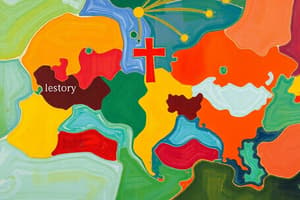Podcast
Questions and Answers
What is the primary focus of economic history?
What is the primary focus of economic history?
- Study of government structures
- Understanding daily life and social structures
- Analysis of cultural expressions and art
- Examination of economic activities, trade, and industry (correct)
Which period is characterized by the rise and fall of empires and the birth of major religions?
Which period is characterized by the rise and fall of empires and the birth of major religions?
- Renaissance and Reformation
- Ancient History (correct)
- Middle Ages
- Prehistoric Era
What significant societal transformation occurred during the Modern History period?
What significant societal transformation occurred during the Modern History period?
- The spread of feudalism
- Growth of agriculture and trade
- Introduction of written records
- Industrial Revolution and social changes (correct)
What method emphasizes organizing events in chronological order?
What method emphasizes organizing events in chronological order?
Who is often referred to as the 'Father of History'?
Who is often referred to as the 'Father of History'?
What does social history focus on?
What does social history focus on?
Which of the following is a key aspect of the Annales School in historical theory?
Which of the following is a key aspect of the Annales School in historical theory?
Which major event is included in the Middle Ages period?
Which major event is included in the Middle Ages period?
Flashcards are hidden until you start studying
Study Notes
Key Concepts in History
-
Definition of History: The study of past events, particularly in human affairs.
-
Importance of History:
- Understanding societal development and change.
- Providing context for current events.
- Learning from past mistakes and successes.
Major Periods in History
-
Prehistoric Era:
- Before written records.
- Includes Stone Age, Bronze Age, and Iron Age.
-
Ancient History:
- Early civilizations (Mesopotamia, Egypt, Indus Valley, China).
- Development of writing, agriculture, and trade.
-
Classical Antiquity:
- Rise and fall of empires (Roman, Greek, Persian).
- Birth of major religions (Judaism, Christianity, Buddhism).
-
Middle Ages:
- Feudalism in Europe.
- The spread of Islam.
- The Crusades and the Black Death.
-
Renaissance and Reformation:
- Revival of art and learning in Europe.
- Protestant Reformation and its impacts.
-
Modern History:
- Industrial Revolution and its social changes.
- World Wars and the Cold War.
- Decolonization and globalization in the late 20th century.
Historical Methods
-
Source Analysis:
- Primary sources: Original documents, artifacts.
- Secondary sources: Interpretations and analyses by historians.
-
Chronology and Timelines:
- Organizing events in chronological order.
- Understanding cause and effect relationships.
Themes in History
-
Political History:
- Study of governments, leaders, and political movements.
-
Social History:
- Focus on everyday life, culture, and social structures.
-
Economic History:
- Examination of economic activities, trade, and industry.
-
Cultural History:
- Exploration of art, literature, and human expression.
-
Environmental History:
- Interaction between humans and the environment throughout time.
Influential Historians and Theories
- Herodotus: Often called the 'Father of History'.
- Thucydides: Emphasized the importance of evidence and analysis.
- Marxist History: Focuses on class struggles and economic factors.
- Annales School: Stresses long-term social history over event-based history.
Conclusion
- History is crucial for understanding human behavior, social dynamics, and the evolution of societies.
- Studying history equips individuals with critical thinking skills and a broader perspective on contemporary issues.
Key Concepts in History
- History is the study of past events, particularly concerning human affairs.
- It provides vital insights into societal development and changes.
- Contextualizing current events helps in understanding their roots.
- Learning from historical successes and mistakes is essential.
Major Periods in History
- Prehistoric Era: Time before written documentation; includes Stone, Bronze, and Iron Ages.
- Ancient History: Development of early civilizations like Mesopotamia, Egypt, Indus Valley, and China; significant advancements in writing, agriculture, and trade.
- Classical Antiquity: Characterized by the rise and fall of empires such as the Roman, Greek, and Persian; emergence of major religions, including Judaism, Christianity, and Buddhism.
- Middle Ages: Marked by feudalism in Europe, the spread of Islam, and significant events like the Crusades and the Black Death.
- Renaissance and Reformation: A revival of art and learning across Europe; the Protestant Reformation led to profound cultural and religious transformations.
- Modern History: Notable for the Industrial Revolution and its societal impacts, including the World Wars, the Cold War, and the processes of decolonization and globalization in the late 20th century.
Historical Methods
- Source Analysis:
- Primary sources consist of original documents and artifacts that provide firsthand evidence.
- Secondary sources are interpretations and analyses created by historians based on primary data.
- Chronology and Timelines: Essential for organizing historical events in sequence, allowing for better understanding of cause-and-effect relationships.
Themes in History
- Political History: Examines the roles of governments, leaders, and significant political movements.
- Social History: Focuses on the everyday life, cultural practices, and social structures of populations.
- Economic History: Investigates economic activities, including trade and industrial developments.
- Cultural History: Explores contributions to art, literature, and human expression throughout time.
- Environmental History: Analyzes the relationship and effects between human activities and the environment over time.
Influential Historians and Theories
- Herodotus: Regarded as the 'Father of History’ for his systematic method of inquiry.
- Thucydides: Stressed the necessity of evidence and analytical rigor in historical writing.
- Marxist History: Focuses primarily on the dynamics of class struggles and economic influences on historical events.
- Annales School: Advocates for a long-term perspective on history, prioritizing social context over individual events.
Conclusion
- History is fundamental for comprehending human behavior, social dynamics, and the evolution of societies over time.
- Engaging with historical study enhances critical thinking abilities and broadens understanding of contemporary issues.
Studying That Suits You
Use AI to generate personalized quizzes and flashcards to suit your learning preferences.




